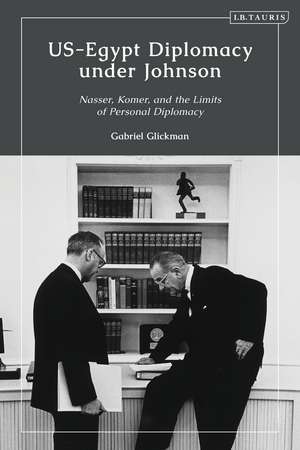US-Egypt Diplomacy under Johnson: Nasser, Komer, and the Limits of Personal Diplomacy
Autor Gabriel Glickmanen Limba Engleză Paperback – 24 aug 2022
| Toate formatele și edițiile | Preț | Express |
|---|---|---|
| Paperback (1) | 199.20 lei 6-8 săpt. | |
| Bloomsbury Publishing – 24 aug 2022 | 199.20 lei 6-8 săpt. | |
| Hardback (1) | 599.57 lei 6-8 săpt. | |
| Bloomsbury Publishing – 24 feb 2021 | 599.57 lei 6-8 săpt. |
Preț: 199.20 lei
Preț vechi: 258.64 lei
-23% Nou
Puncte Express: 299
Preț estimativ în valută:
38.13€ • 41.43$ • 32.05£
38.13€ • 41.43$ • 32.05£
Carte tipărită la comandă
Livrare economică 21 aprilie-05 mai
Preluare comenzi: 021 569.72.76
Specificații
ISBN-13: 9780755639946
ISBN-10: 0755639944
Pagini: 296
Dimensiuni: 156 x 234 mm
Greutate: 0.41 kg
Editura: Bloomsbury Publishing
Colecția I.B.Tauris
Locul publicării:London, United Kingdom
ISBN-10: 0755639944
Pagini: 296
Dimensiuni: 156 x 234 mm
Greutate: 0.41 kg
Editura: Bloomsbury Publishing
Colecția I.B.Tauris
Locul publicării:London, United Kingdom
Caracteristici
Brings to light role of Robert Komer, a US government staffer who played an outsize role in US Egypt policy
Notă biografică
Gabriel Glickman is an Associate Fellow at Bar-Ilan University's Begin-Sadat Center for Strategic Studies. His writing has appeared in publications such as The Washington Post, The National Interest, The Jerusalem Post, and The Hill.
Cuprins
PART 1: AFTER KENNEDY (NOVEMBER 1963-JUNE 1964)1. Prologue: Kennedy's Men2. Komer's War3. Nasser's New Frontier4. Weapons and Bases5. Enter Britain6. Badeau's Final MissionPART II: AFTER BADEAU (JUNE 1964-MARCH 1966)7. Starting Over With/In Cairo8. Two Summits9. Communication Breakdown10. Congress Reacts11. Komer's Gamble12. Johnson's Reluctance13. Rusk Takes Over14. The $37 Million15. Another Long Summer16. Komer's Final Campaign17. Sadat's VisitPART III: AFTER KOMER (MARCH 1966-MAY 1967)18. Johnson's Men19. A New Policy20. Nasser's Last Stand21. Cold Shoulders22. U.S.-Egyptian Relations Unbound23. Epilogue: Applied History
Recenzii
"US-Egypt Diplomacy under Johnson is a well-researched and significant book which chronicles and analyzes how one government official, Robert Komer, shaped American-Egyptian diplomatic relations. For Komer, a grand strategy meant working with Nasser - in spite of ideological differences - to contain Soviet influence in the Middle East. This book is a must read for anyone wishing to understand how one individual greatly influenced diplomacy between Washington and Cairo from the Kennedy Administration to the Johnson Administration."
Gabriel Glickman has written an illuminating history of U.S.-Egyptian diplomacy in the LBJ era. It's an account of world affairs, grand strategy, strong personalities, bureaucratic fancy footwork, idealism, calculation, lies and naiveté. Especially fascinating is the story of how Egypt's Nasser condemned the United States in justifying his actions that brought on the 1967 Six Days War with Israel. Were Nasser's complaints about U.S. policy a substantial factor in Egypt's war policy, or mostly a pretext? Could the United States have averted the war by giving more aid to Egypt? These are worthy questions, and Professor Glickman's book contributes importantly to the debate.
Gabriel Glickman has written an illuminating history of U.S.-Egyptian diplomacy in the LBJ era. It's an account of world affairs, grand strategy, strong personalities, bureaucratic fancy footwork, idealism, calculation, lies and naiveté. Especially fascinating is the story of how Egypt's Nasser condemned the United States in justifying his actions that brought on the 1967 Six Days War with Israel. Were Nasser's complaints about U.S. policy a substantial factor in Egypt's war policy, or mostly a pretext? Could the United States have averted the war by giving more aid to Egypt? These are worthy questions, and Professor Glickman's book contributes importantly to the debate.
